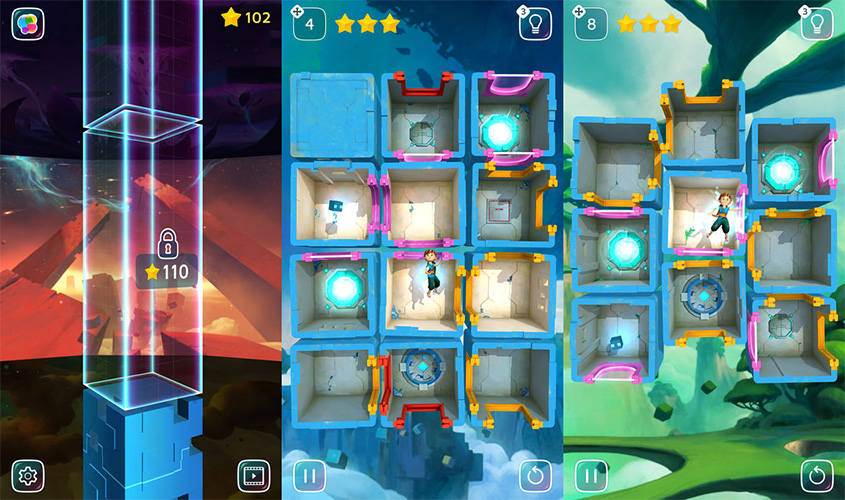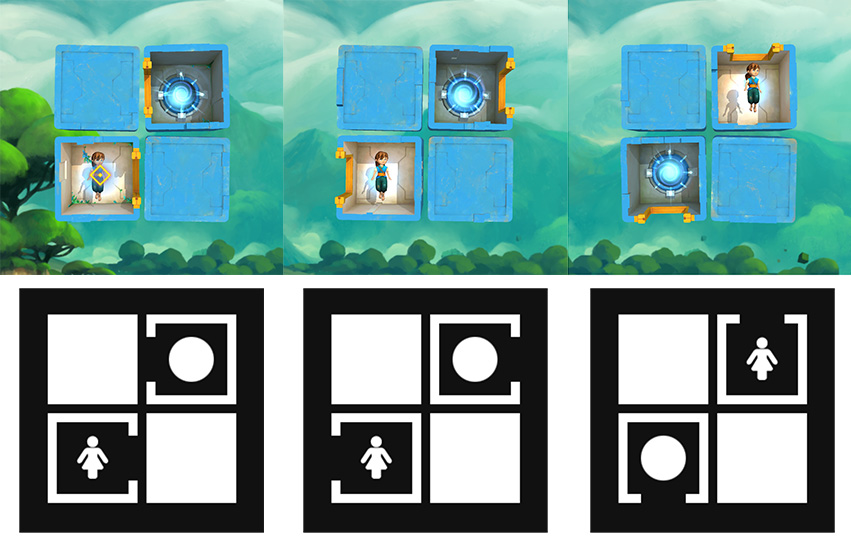Build a HTML5 game like iOS lovely puzzle game “Warp Shift” using Phaser
Talking about Warp Shift game, Game development, HTML5, Javascript and Phaser.
Learn cross platform HTML5 game development
Check my Gumroad page for commented source code, games and books.
 Warp Shift is a unique puzzle game set in a mysterious world. AppSpy says that it “is well-balanced and gorgeous to look at and filled to the brim with innovative twists and new ideas.”
It’s not easy to create a detailed tutorial of a game like this one, so we are approaching it step by step. In the first step, this one, we are going to build the engine which will render the first three levels. There’s a precise reason behind this choice: they are the most basic levels, as starting from level 4 new elements are added, and as said we are going step by step.
Let me show you the tilesheet used in the prototype:
Warp Shift is a unique puzzle game set in a mysterious world. AppSpy says that it “is well-balanced and gorgeous to look at and filled to the brim with innovative twists and new ideas.”
It’s not easy to create a detailed tutorial of a game like this one, so we are approaching it step by step. In the first step, this one, we are going to build the engine which will render the first three levels. There’s a precise reason behind this choice: they are the most basic levels, as starting from level 4 new elements are added, and as said we are going step by step.
Let me show you the tilesheet used in the prototype:

 And this is the script capable of doing it:
And this is the script capable of doing it:
// the game itself
var game;
// this object contains all customizable game options
// changing them will affect gameplay
var gameOptions = {
// game width, in pixels
gameWidth: 400,
// game height, in pixels
gameHeight: 400,
// tile size, in pixels
tileSize: 100,
// margin between two tiles, in pixels
tileMargin: 10
}
// some constants (actually they are variables) where to store tile properties
var UP = 1;
var RIGHT = 2;
var DOWN = 3;
var LEFT = 4;
var EXIT = 5;
var PLAYER = 6;
// function to create a block object
function block(){
// this is the default block object
var defaultBlock = {
// can't walk through top side
up: false,
// can't walk through right side
right: false,
// can't walk through bottom side
down: false,
// can't walk through left side
left: false,
// there's no level exit on this block
exit: false,
// the player is not on this block
player: false
}
// looping through all function arguments, if any
for(var i = 0; i < arguments.length; i++){
// checking the i-th argument
switch(arguments[i]){
// if it's UP, then set defaultBlock's "up" key to true
case UP:
defaultBlock.up = true;
break;
// if it's RIGHT, then set defaultBlock's "right" key to true
case RIGHT:
defaultBlock.right = true;
break;
// if it's DOWN, then set defaultBlock's "down" key to true
case DOWN:
defaultBlock.down = true;
break;
// if it's LEFT, then set defaultBlock's "left" key to true
case LEFT:
defaultBlock.left = true;
break;
// if it's EXIT, then set defaultBlock's "exit" key to true
case EXIT:
defaultBlock.exit = true;
break;
// if it's PLAYER, then set defaultBlock's "player" key to true
case PLAYER:
defaultBlock.player = true;
break;
}
}
return defaultBlock;
}
var levels = [
// level 1
[
[block(), block(LEFT, EXIT)],
[block(RIGHT, PLAYER), block()]
],
// level 2
[
[block(), block(RIGHT, EXIT)],
[block(LEFT, PLAYER), block()]
],
// level 3
[
[block(), block(UP, PLAYER)],
[block(DOWN, EXIT), block()]
]
]
// function to be execute once the page loads
window.onload = function() {
// creation of a new Phaser Game
game = new Phaser.Game(gameOptions.gameWidth, gameOptions.gameHeight);
// adding "TheGame" state
game.state.add("TheGame", TheGame);
// launching "TheGame" state
game.state.start("TheGame");
}
/* ****************** TheGame state ****************** */
var TheGame = function(){};
TheGame.prototype = {
// function to be executed when the game preloads
preload: function(){
// load the spritesheet with all tiles
game.load.spritesheet("tile", "assets/sprites/tile.png", gameOptions.tileSize, gameOptions.tileSize);
// scaling the game to cover the entire screen, while keeping its ratio
game.scale.scaleMode = Phaser.ScaleManager.SHOW_ALL;
// horizontally centering the game
game.scale.pageAlignHorizontally = true;
// vertically centering the game
game.scale.pageAlignVertically = true;
// set background color
game.stage.backgroundColor = 0x111111;
},
// function to be executed as soon as the game has completely loaded
create: function(){
// we start from level 0
this.level = 0;
// this method generates a level
this.generateLevel();
},
// function to generate a level
generateLevel: function(){
// tileAndMargin is the sum of tile and margin size
var tileAndMargin = gameOptions.tileSize + gameOptions.tileMargin;
// creation of a group where to place level items
this.levelGroup = game.add.group();
// temporary array to store the level so we don't need to modify the original levels
this.tempLevel = [];
// looping through level rows
for(var i = 0; i < levels[this.level].length; i++){
// preparing the temporary array to store the i-th row
this.tempLevel[i] = [];
// looping through level columns
for(var j = 0; j < levels[this.level][i].length; j++){
// adding the tile on the stage
var tile = game.add.image(j * tileAndMargin + gameOptions.tileSize / 2, i * tileAndMargin + gameOptions.tileSize / 2, "tile");
// set tile registration point to its center
tile.anchor.set(0.5);
// adding tile to level group
this.levelGroup.add(tile);
// now it's time to assign the tile a frame. If there is no exit, it's frame zero
if(!levels[this.level][i][j].up && !levels[this.level][i][j].right && !levels[this.level][i][j].down && !levels[this.level][i][j].left){
tile.frame = 0;
}
else{
// if there's an exit on the top, it's frame one
if(levels[this.level][i][j].up){
tile.frame = 1
}
// if there's an exit on the right, it's frame two
if(levels[this.level][i][j].right){
tile.frame = 2;
}
// if there's an exit on the bottom, it's frame three
if(levels[this.level][i][j].down){
tile.frame = 3;
}
// if there's an exit on the left, it's frame four
if(levels[this.level][i][j].left){
tile.frame = 4;
}
// if there's the level exit...
if(levels[this.level][i][j].exit){
// we add the exit tile
var exit = game.add.image(0, 0, "tile");
// set exit tile registration point to its center
exit.anchor.set(0.5);
// assign exit tile frame six
exit.frame = 6;
// set exit tile as a child of current tile
tile.addChild(exit);
}
// if there's the player...
if(levels[this.level][i][j].player){
// we add the player tile
var player = game.add.image(0, 0, "tile");
// set player tile registration point to its center
player.anchor.set(0.5);
// assign player tile frame five
player.frame = 5;
// set player tile as a child of current tile
tile.addChild(player)
}
}
// now copying original level item into temporary level item
this.tempLevel[i][j] = {
up: levels[this.level][i][j].up,
right: levels[this.level][i][j].right,
down: levels[this.level][i][j].down,
left: levels[this.level][i][j].left,
exit: levels[this.level][i][j].exit,
player: levels[this.level][i][j].player,
// here we store the tile
sprite: tile
}
}
}
// center the group on the stage
this.levelGroup.x = (game.width - this.levelGroup.width) / 2;
this.levelGroup.y = (game.height - this.levelGroup.width) /2;
}
}
Never miss an update! Subscribe, and I will bother you by email only when a new game or full source code comes out.

